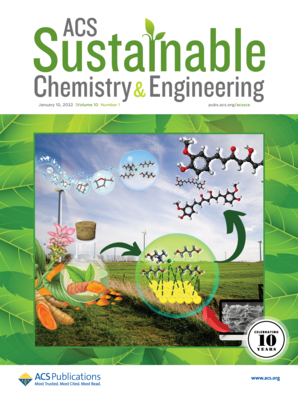Copper/Iron Cocatalyzed Depolymerization of Postconsumer Polycarbonate: A One-Pot Strategy to Synthesize Aryl Ethers
IF 7.1
1区 化学
Q1 CHEMISTRY, MULTIDISCIPLINARY
引用次数: 0
Abstract
The synthesis of value-added chemicals from plastic waste, which poses a significant environmental threat, is both intriguing and challenging. Consequently, developing new methods for the depolymerization of plastic has become essential due to its increasing demand and usage. In this context, we have developed a base-driven, Cu/Fe-cocatalyzed depolymerization method for polycarbonates (PC), transforming them into diaryl ether and diaryl diethers in a one-pot process. This methodology exclusively utilized postconsumed real-life PCs. By varying reaction parameters, we successfully utilized PC as a nucleophile source to produce a range of products including diaryl ethers and diaryl diethers. A wide array of aryl halides and PCs with molecular weights ranging from 86,000 to 20,000 were screened using this approach. Gram-scale reactions underscored the potential and scalability of ether synthesis. The synthetic utility of the obtained ethers was further explored, leading to the synthesis of diverse value-added products. NMR experiments revealed that the depolymerization of PCs is driven by the base, which subsequently generates potassium diphenolate for cross-coupling with aryl halides in the presence of the Cu/Fe cocatalytic system.

求助全文
约1分钟内获得全文
求助全文
来源期刊

ACS Sustainable Chemistry & Engineering
CHEMISTRY, MULTIDISCIPLINARY-ENGINEERING, CHEMICAL
CiteScore
13.80
自引率
4.80%
发文量
1470
审稿时长
1.7 months
期刊介绍:
ACS Sustainable Chemistry & Engineering is a prestigious weekly peer-reviewed scientific journal published by the American Chemical Society. Dedicated to advancing the principles of green chemistry and green engineering, it covers a wide array of research topics including green chemistry, green engineering, biomass, alternative energy, and life cycle assessment.
The journal welcomes submissions in various formats, including Letters, Articles, Features, and Perspectives (Reviews), that address the challenges of sustainability in the chemical enterprise and contribute to the advancement of sustainable practices. Join us in shaping the future of sustainable chemistry and engineering.
 求助内容:
求助内容: 应助结果提醒方式:
应助结果提醒方式:


